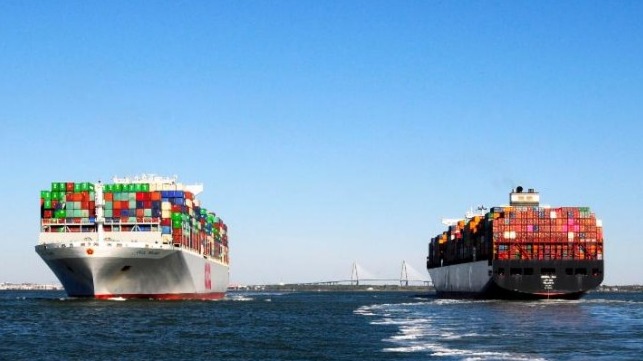Wind, Slow Steaming, and Fuels Could Half Ships' GHG Emissions by 2030

Shipping has the technical potential with the tools available today to cut its greenhouse gas emissions anywhere between a quarter to a half by 2030 according to a new independent report conducted by the respected consultancy CE Delft for four leading environmental groups. They argue that this can be achieved without significant financial costs providing the confirmation needed for the IMO’s Marine Environment Protection Committee (MEPC) to act decisively at its upcoming meeting.
IMO member states are due to convene for a session in July 2023 that will adopt the revisions to the IMO’s declared strategy for greenhouse gas emissions. Since 2018, the IMO position has been that shipping will reduce emissions by 50 by 2050 relative to 2008.
Environmentalists, scientists, and many organizations argue that these goals are far too lax for an industry that accounts for three percent of the world’s emissions and rising. The EU for example came out last week saying the shipping industry is heading in the wrong direction and that the IMO needs to be more ambitious in its efforts.
Proposals being put forth in advance of the MEPC meeting are calling for faster reductions with some saying the industry must cut emissions by 50 percent over the next seven years to 2030. The most aggressive positions call for the total elimination of GHG emissions anywhere between 2040 and 2050. Against this background, the four groups, Transport & Environment, Seas at Risk, Ocean Conservancy, and Pacific Environment, asked CE Delft to estimate the maximum technical abatement potential by 2030 and the minimal remaining GHG emissions from shipping.
“Countries and shipping companies have raised real concerns about the technological and economic feasibility of achieving the 1.5°C-aligned goal of halving emissions by 2030,” highlights Delaine McCullough of the Ocean Conservancy. “This analysis clearly shows that these reductions are possible and that costs are not a barrier. The evidence couldn’t come at a better time. The IMO must not squander what may be the last best opportunity to put shipping on track to prevent a climate disaster.”
Delft in its report concludes that it is technically possible by gradually starting in 2025 to reduce shipping emissions in a range between 28 and 47 percent by 2030 relative to 2008 levels. Implementing these measures, the report concludes, would increase shipping costs between six and fourteen percent on average.
“The evidence shows that halving emissions by 2030 is technically possible and that the costs are manageable. What is needed is the political will. The IMO cannot afford to miss this opportunity,” said Faïg Abbasov, of the influential group Transport & Environment.
The report creates a broad range of scenarios using technical and operational abatement options that Delft highlights are available to the industry now. They call for the adoption of wind-assisted propulsion, speed reductions ranging between 20 and 30 percent for vessels that would result in emissions reductions, and between five and ten percent adoption of zero-GHG fuels. They factor into the analysis changes in fleet size to compensate for the reduction in capacity from slow steaming.
They calculate that just over half of the total reduction would come from operational measures including slow steaming, while wind-assisted propulsion and zero or near zero GHG fuels would each result in a quarter of the total reduction.
The cost impact varies in the different scenarios in part due to the level of fuel transition as well as the proportion of speed reduction. A 20 percent reduction in speed they report would be the highest cost compared to a 30 percent reduction. Similarly, the higher the percentage of alternative fuels the higher the cost impact.
The four organizations commissioning the research argue that it provides the evidence needed for MEPC to active to dramatically increase the IMO’s targets to reduce emissions. They contend the IMO has a historic opportunity and must act now if shipping is going to align with the broader environmental goals adopted in the Paris Agreement.
No comments:
Post a Comment